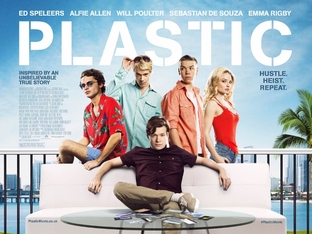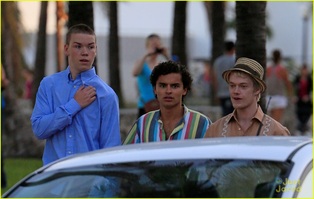
Britain is famed for its crime dramas and thrillers. By utilising our cobbled streets, gangster backdrop, charismatic actors, and even our hard sounding accents, we have produced some great crime films. With Plastic, the director hopes to follow in the footsteps of great British crime thrillers, but sadly makes a flat and un-entertaining film.

The film was co-written and directed by Julian Gilbey. The director had previously worked on thrillers Rise of the Footsolider and A Lonely Place to Die. With Plastic, you have a similar feel of British crime thriller. The film is supposedly based on real events which seems very far fetched (like most based on real events claims) as this is not a film based in any realistic setting.
In terms of the style of the film, it feels a little lost. The film is not aiming for the gritty realism of British crime thrillers such as Dead Man’s Shoes. Yet the film lacks the stylish touch of Guy Ritchie’s mock gangster flicks like Snatch. The filmmaker has chosen to aim for a more stylised crime caper feel, but the film comes up wanting.

The story centres on the four boys and their relationship with each other. It is clear from the start that there is a divide in the group, Fordy siding with Sam and Rafa easily manipulated by Yatesey. The four leads are not bad in the film, but do not have any real character development or story to work with.
Speleers shows some charisma as leader Sam, explaining how he has managed to forge his criminal group, but we never get his motivations. Allen portrays a sleazy and greedy anti-villain that creates tension in the group, but the character is clichéd and dense. Poulter is a rising star with such great turns elsewhere, but here his screen time and dialogue are so minimal that you barely notice he is in the film. A severely absent and under-developed character for such a promising young actor. De Souza manages to portray a naive young boy whose dreams involve sports cars and girls, but still the character has no deeper significance.

One thing the film does which must be applauded is that it does not justify the boys' reasons for stealing. Instead of tragic back stories of poor families or being driven by desperation, the boys steal because they want nice clothes, fancy cars and to party. It is a more satirical and sadly realistic viewpoint of our attainment-obsessed culture. Only Frankie has an outside reason to steal the money, which is spliced into the film so briefly you almost forget it.
Although using an unoriginal but good concept, Plastic merely rehashes plots and scenes from bigger and better films. Squandering the promise of its lead cast for a few thrills and an ironically wooden story.

 RSS Feed
RSS Feed
